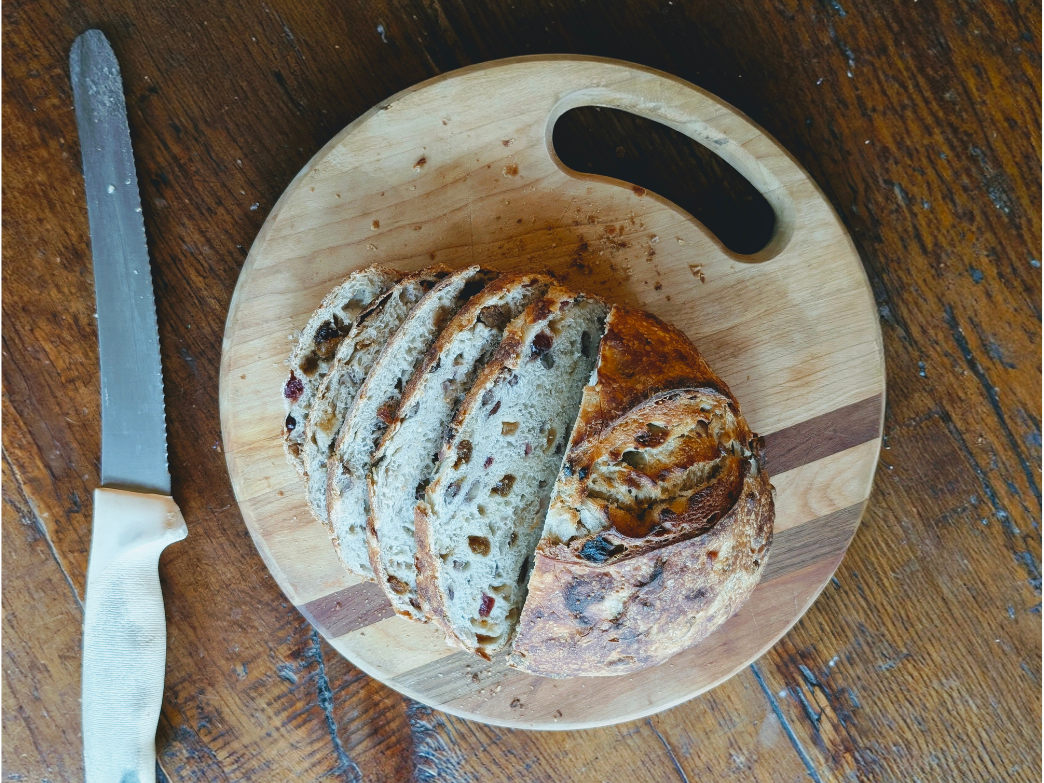By Dr. Jorge, Ph.D.
Wildgrain, opens in a new tab is the first bake-from-frozen subscription box for sourdough breads, fresh pastas, and artisanal pastries.
Most people tend to have a preference on what kind of bread they reach for. Whether it’s sourdough, ciabatta, or a baguette, you likely have a favorite. However, do you know the differences between bread types, and do you know what the nutritional value is of different kinds of bread? In this article, we’ll discuss what differentiates some of the most common bread types and which is the healthiest option.
What is the difference between sourdough bread vs. French bread vs. baguette vs. ciabatta vs. Italian bread?
The main difference between sourdough bread and other popular bread options is the leavening agent, or the substance used in the dough to make it rise. Sourdough bread uses a sourdough starter that is fermented slowly, while other types of bread, such as French bread, baguette, ciabatta, or Italian bread, use pre-fermented commercial yeast.
What’s the difference between sourdough vs. ciabatta? Which is softer: sourdough or ciabatta?
In addition to the varying leavening agents used, the texture and flavor of sourdough bread and ciabatta bread are different due to the ingredients and process used in making the bread. For example, ciabatta bread has a higher water content, giving ciabatta an airier and lighter texture compared to sourdough bread. Ciabatta bread also has a crustier outer layer while sourdough bread tends to be chewier. These two types of bread also have differences in taste. Ciabatta bread generally has a milder flavor, while sourdough bread often has a distinct tangy flavor.
Is French bread the same as sourdough?
French bread is not the same as sourdough bread. French bread and sourdough bread use different leavening agents, with French bread using commercial yeast and sourdough bread using a sourdough starter made with wild yeast. Due to the differences in leavening agents, fermentation times also differ. Sourdough bread has a longer and slower fermentation process than French bread.
French bread and sourdough bread also differ in how they look, with French bread generally having a longer and thinner shape, and sourdough bread having a rounder shape. Moreover, France has specific laws in place that dictate the ingredients used to make French bread. Because of this law, traditional French bread can only be made using wheat flour, water, salt, and yeast. In contrast, sourdough bread ingredients can differ depending on the type of flour used or other ingredients added, such as fruits and nuts. French bread tends to be characterized by a thinner and crispier crust, while sourdough bread has a chewier texture. However, sourdough texture can vary based on grains and the amount of water used to make the dough.
Is sourdough bread healthier than French bread?
Sourdough bread tends to be healthier than French bread. The slower fermentation process of sourdough bread provides additional nutrients and antioxidants that aren’t found in other kinds of bread, like French bread, that are made with commercial yeast. Sourdough bread is also easier to digest and has a lower glycemic index than French bread.
Are French baguettes made of sourdough? Are sourdough bread and baguettes the same thing?
French baguettes are not traditionally made with sourdough, but it is possible to make a sourdough French baguette. French baguettes are typically made with wheat flour, yeast, salt, and water. Baguettes have a notable thin and long-shaped loaf that has a crunchy outer crust. Sourdough bread is typically made with sourdough starter, flour, water, and salt. Similar to other types of French bread, baguettes have a milder flavor compared to the tangy flavor of sourdough bread.
Is sourdough bread healthier than baguette?
Sourdough bread is healthier than baguette bread. The higher amounts of vitamins, minerals, and antioxidants in sourdough bread due to the slow fermentation process make sourdough more nutritious than baguette bread. However, sourdough baguettes or baguettes made with whole grains can be healthier alternatives to traditional baguette bread.
Is sourdough bread healthier than Italian bread?
Sourdough bread is healthier than Italian bread. Like the other bread types touched on thus far, Italian bread is made using commercial yeast. Since Italian bread does not traditionally use wild yeast that ferments slowly, Italian bread does not have the enhanced nutritional content that sourdough bread has. Nonetheless, you can opt for Italian bread that is made with whole grains or for sourdough Italian bread as healthier alternatives.
Is sourdough bread healthier than ciabatta?
Sourdough bread is healthier than traditional ciabatta bread. Ciabatta bread is a popular type of Italian bread, and therefore, is less nutritious than sourdough bread due to the leavening agent used. However, if you are searching for a healthier ciabatta bread, you can choose one made with sourdough or whole grains.
Looking for the best sourdough bread? Try Wildgrain
Interested in trying baked-fresh sourdough breads made with no added sugar? Wildgrain is the first bake-from-frozen delivery subscription service for breads, pastries, and fresh pastas. Some of our more popular breads include Sourdough Loaf, Whole Wheat Sourdough Loaf, Olive Oil Ciabatta, and Sourdough 7-Grain Loaf. Learn more about Wildgrain and our artisanal baking methods.
About the Author



